I define my relationship with books in much the same way I describe my relationship with music. Both are load-bearing pillars in the structure of who I am. Yet, they remain somewhat distinct in my mind. Perhaps it’s because music is a medium of sound and books are visual (I’m not an audiobook guy, but respect to readers who are; whatever gets you to the back cover!).
When a book intertwines words with music, I find it a distinctly joyful experience. On occasion, I find connections between the books and music I love, as evidenced by the piece I wrote about Soundtracking A Story on my own site (or my friend’s post that inspired it). The truly rare gem, though, is the book that gets music right, despite being a big ol’ collection of written words. Today, I’m listing five SFF books that fit the (play)bill.
Year Zero by Rob Reid
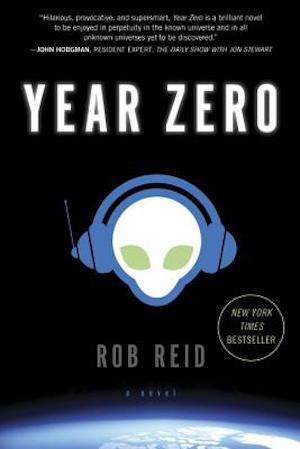
Year Zero contains quite possibly my favorite book premise of all time. A galactic coalition of alien species values art more than anything. Music is their favorite form of artistic expression, and Earth makes the best music, bar none. But the aliens altruistically submit themselves to the origin planet’s laws governing copyright infringement, content consumption, and piracy.
Long story short, aliens owe Earth musicians trillions upon trillions of dollars for breaking copyright laws and illegally streaming human music. Problem is, Earth doesn’t know that interplanetary species exist. A few aliens try to solve this problem by contacting Earth lawyer Nick Carter to help them resolve the issue.
Author Rob Reid is best known for founding Rhapsody, a now-defunct music streaming service and marketplace. He pulls on those threads throughout the book and offers an interesting and comedic take on how we consume music. I haven’t read the novel in a long time, but my guess is some of the concepts will feel even more relevant now than they did years back, thanks to the advent of Spotify and Apple Music.
The Kingkiller Chronicle by Patrick Rothfuss
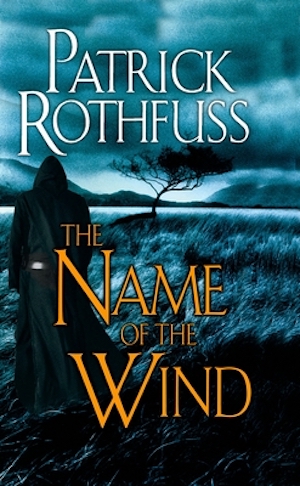
Before we start, I’m not interested in anyone’s take on Rothfuss’ release schedule, which can be discussed in any number of other places. For the purposes of this discussion, I’m simply here to acknowledge that both The Name of the Wind and The Wise Man’s Fear do music justice to a memorable degree. I don’t know the extent of Rothfuss’ musical training, but he captures the thrill of playing music gloriously within these books.
Beyond the actual act of playing and hearing music, he creates beautiful settings and venues in which his characters can express themselves. The Eolian was an instant selection when compiling my list of fantasy cafes I’d like to visit, bursting as it is with musical talent and performers.
Readers praise Rothfuss’ prose as “lyrical.” Other authors earn the distinction too, but I think it’s often used interchangeably with “flowery” or “poetic.” “Lyrical” indicates beauty, that je ne sais quoi transcending the prose beyond the realm of the usual, expressing and evoking emotion in the same irresistible way a song might. Rothfuss does that and more, in my opinion, elevating his words to the point where they feel uniquely musical and magical.
Skin & Earth by Lights
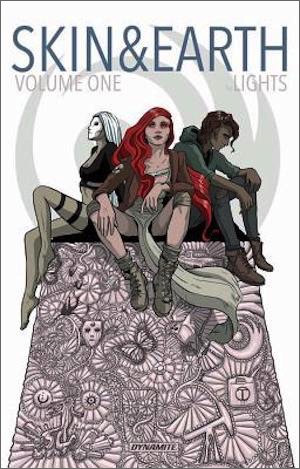
Canadian musician/songwriter/performer Lights tacks another designation or two—visual artist and writer— onto her résumé with Skin & Earth.
Skin & Earth is a graphic novel and a full length album. Each chapter of the graphic novel corresponds to a track from the record. It’s a media crossover project from the mind of one woman, who—if you ask me—does not get anywhere near the amount of praise and accolades she deserves.
Skin & Earth as a graphic novel is a gripping tale about identity, just as the album explores these concepts through music. It doesn’t hurt that the album contains more than a few certified bangers. “Kicks” is my all-time favorite Lights tune.
I recommend listening to the album as you enjoy the graphic novel, then consuming each on its own. As a whole, the multimedia Skin & Earth experience offers a unique and cohesive project from an artist in her prime.
Star Daughter by Shveta Thakrar
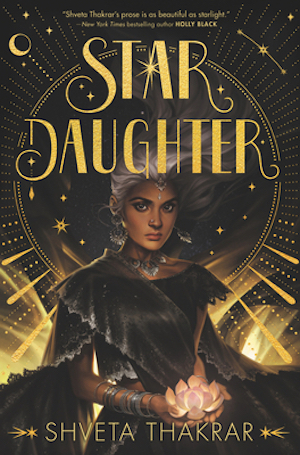
Shveta Thakrar’s Star Daughter deserves a read for myriad reasons, including its musical elements.
Sheetal Mistry’s life upends and turns to the skies when she begins to feel the pull of the starsong, a mysterious melody she can hear and feel deep within her soul.
Eventually, she ends up in the celestial kingdom of her mother, where she must compete in a talent show to decide which Nakshatras (family-run houses of stars) will lead the realm.
Music’s role in Star Daughter is subtle. The starsong reads like a hint of a feeling in the back of Shetal’s mind (though I’d love to hear it live if an adaptation were to happen). The talent show features some music, too. Sheetal’s human boyfriend plays music as well, reflecting how the songs and artists we respond to influence and manifest in our bonds and relationships with others.
The Umbrella Academy by Gerard Way
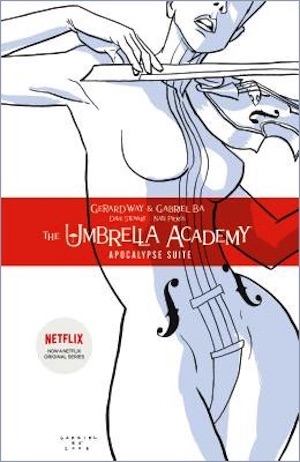
Both the Umbrella Academy graphic novels and Netflix series grapple with music, particularly through the lens of Viktor, the Hargreeves sibling with no discernible superpower (or so it seems, early on). Viktor plays violin like a true maestro, and his talents become so strong that he could bring disaster to earth. (Note: Viktor came out as a trans man in Season 3 of the show; prior to that, and in the comics, he went by the name Vanya.)
Hated by his adoptive father and cast aside by his siblings, Viktor finds some small solace in the violin. I’m not interested in spoiling the story for you. Instead, I’d like to call out the universality of Viktor’s experience. We can all remember a song, a performance, a concert that succeeded in pulling us from our worries and woes, even if only for a few minutes. Viktor’s story takes this to the utmost extreme, but it’s still deeply relatable. At least until…well, I should be quiet now, but suffice it to say things take a turn.
Gerard Way is more deeply entwined with music than the average author. He’s best known as the frontman of My Chemical Romance. I listened to Welcome To The Black Parade for my first time this year, thanks to a reader friend who recommended it. 10/10, and I can see how Way brought his musical storytelling chops to the forefront for his work in Umbrella Academy.
***
Chime in with your favorite musical stories or unique takes on music in SFF in the comments below!
Cole Rush writes words. A lot of them. For the most part, you can find those words at The Quill To Live or on Twitter @ColeRush1. He voraciously reads epic fantasy and science-fiction, seeking out stories of gargantuan proportions and devouring them with a bookwormish fervor. His favorite books are: The Divine Cities Series by Robert Jackson Bennett, The Long Way To A Small, Angry Planet by Becky Chambers, and The House in the Cerulean Sea by TJ Klune.










